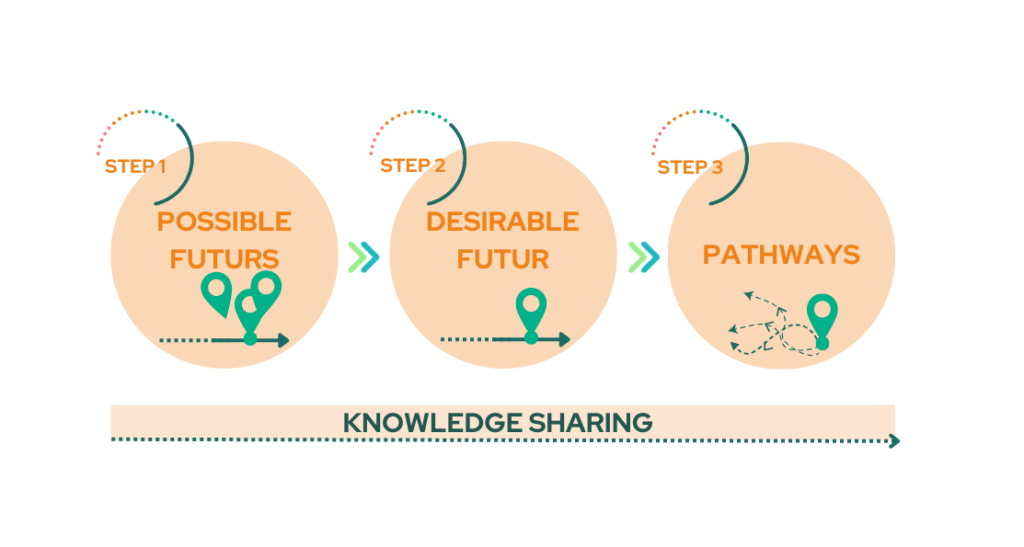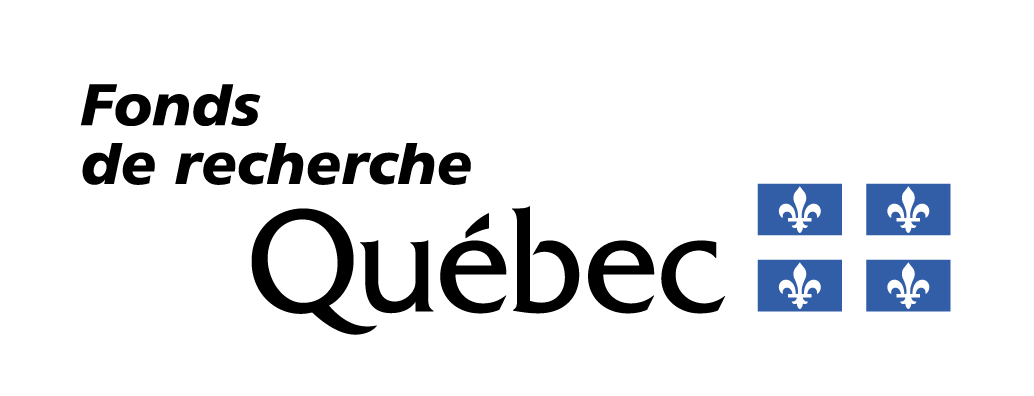The RRECQ, with methodological support from Chemins de transition (French only), is initiating a participatory process to develop a “Roadmap for the transition to a circular economy in Québec society by 2050”. The process will take just over a year to create together a vision of a future that is both desirable and possible, towards a profoundly different economic model.
This project is one of the Network’s Flagship Projects and Themes, and its aim is to co-create a collective vision of a circular future. To achieve this, the RRECQ is putting into practice an approach that includes knowledge synthesis, participatory co-design workshops, and the involvement of experts throughout the process.
How can we accelerate and experience a transition to a circular economy that is not forced, but desired and co-created by everyone?
The RRECQ is proposing an engaging process with an interdisciplinary, systemic and inclusive approach, around scenarios for a Québec circular society in 2050. With the strength of the Network and the expertise of Chemins de Transition, the aim is to involve as many diverse stakeholders as possible.
At the end of the process, the path(s) towards a circular economy that will chart the course from 2024 to 2050 will depend largely on the people who join the adventure.
A Three-Stage Process

The process, comprising stages #1 ”Possibles Futures”, #2 ”Desirable Future” et #3 ”Pathways”, with the transversal notion of knowledge sharing, is based on Chemins de Transition method (French only).
#1 ”Possibles Futures” aims to open up the field of vision in order to explore all that can be anticipated as potential futures. The basis of this step is the mobilization of different sciences and knowledge to draw up a prospective diagnosis that brings together a range of information on the future.
Already, the RRECQ team has conducted focus groups and discussions with over twenty specialists from a variety of academic and professional backgrounds on three themes that will be used to draw up the prospective diagnosis:
- Moving towards circularity: ecosystem of players, social economy, information/data, policies/legislation, education/research, entrepreneurship/employment.
- Managing resources towards circularity: natural resources, material footprint, population needs, planetary limits, residual materials, sober/resilient lifestyles.
- Producing and consuming circular: business models, sectors/value chains, strategies, production/consumption, rebound effect, transition levers/challenges.
What is the prospective diagnosis? A document that summarizes our findings on the current situation, identifies the trends that will change the course of things, presents the tensions between the different priorities, and finally the unresolved questions linked to the transition.
Based on Chemins de transition‘s documentation
(French only)#2 ”Desirable Future” aims to collectively choose the most desirable future for 2050 from among all these possible evolutions. This objective is mediated by a series of co-design or, in other words, co-creation workshops in which, by immersing themselves in short stories embodied by characters and inspired by the future, participants lay the foundations for a collective vision of the circular future of Québec society.
#3 ”Pathways” seeks to establish links between the current situation and the desired future by proposing trajectories marked out by steps to be taken to achieve this transition. These trajectories are the result of rigorous work by experts, including the anticipation of future risks and possible forks on the road.
Three committees of some 50 experts are working on the collective vision that emerged from the co-design workshops held in autumn 2023, to develop one or more concrete paths to link the present to the desired circular future.
Committee members :
Specialized, sustainable and resilient circular production
A culture that values sobriety, circularity, solidarity and nature
Inclusive, transparent and equitable resource governance that protects ecosystem health
- Annie Ferlatte (Communautique, Fab Lab)
- Annie Levasseur (ÉTS)
- Chantal Rossignol (CERIEC)
- Émilie Dupont (Synergie Québec, SADC du Kamouraska)
- Gaëlle Généreux (PME MTL)
- Geneviève Dionne (Éco Entreprises Québec)
- Hélène Gervais (RECYC-QUÉBEC)
- Hélène Lauzon (CPEQ)
- Hortense Montoux (CERIEC)
- Joseph Khoury (HEC Montréal)
- Luciano Barin Cruz (HEC Montréal)
- Marie-France Bellemare (Insertech)
- Martine Vézina (HEC Montréal)
- Olivier Dulude (CPEQ)
- Rafael Ziegler (HEC Montréal)
- Rayane Baitiche (MELCCCFP)
- Sara Perez-lauzon (HEC Montréal)
- Amélie Cote (Équiterre)
- Anne-Marie Corriveau (UdeS)
- Barbara Duroselle (TIESS)
- Caroline Boivin (UdeS)
- Cécile Bulle (UQAM)
- Chloé Steux (École Polytechnique Paris)
- Chourouk Ouerghemmi (UQAC)
- Christophe Abrassart (UdeM)
- Claire Pédrot (Environnement Côte-Nord)
- Ghina El Haffar- (McGill)
- Gilles Parent (Repair Café Montréal)
- Isabelle Lessard (Futur Simple)
- Isabelle Moïse (RECYC-QUÉBEC)
- Laura Grenier-Paquette (Synergie économique Laurentides)
- Myriam Ertz (UQAC)
- Tanguy Marquer (Repair Café Montréal)
- Aure Adell (ECPAR)
- Catherine Gauthier-Dion (MAPAQ)
- Cathy Baptista (RRECQ)
- Emmanuel Raufflet (HEC)
- Étienne Angers (RECYC-QUÉBEC)
- Fanny Tremblay-Racicot (ENAP)
- Gabrielle Gareau (Chantier de l’économie sociale)
- Jeanne Desrosiers (Stagiaire- MELCCCFP)
- Marc Journeault (Université Laval)
- Martin Deron (UdeM, CdT)
- Mathias Glaus (ÉTS)
- Maude Vuillemard (MERN)
- Para Radanielina (MAPAQ)
- Sabrina Cholette (BCDD- MELCCCFP)
- Sophie Bernard (Polytechnique Montréal)
- Stéphan Gagnon (MERN)
- Stephanie H. Leclerc (McGill)
- Tasseda Boukherroub (ÉTS)
- Valérie Patreau (Polytechnique Montréal)
A transformation chosen, by and for the community
We need to move towards a rapid and effective transition involving all sectors of society in an informed, considered, discussed and, above all, chosen transformation. This is what the RRECQ is committed to doing with this structuring roadmap project for society.
